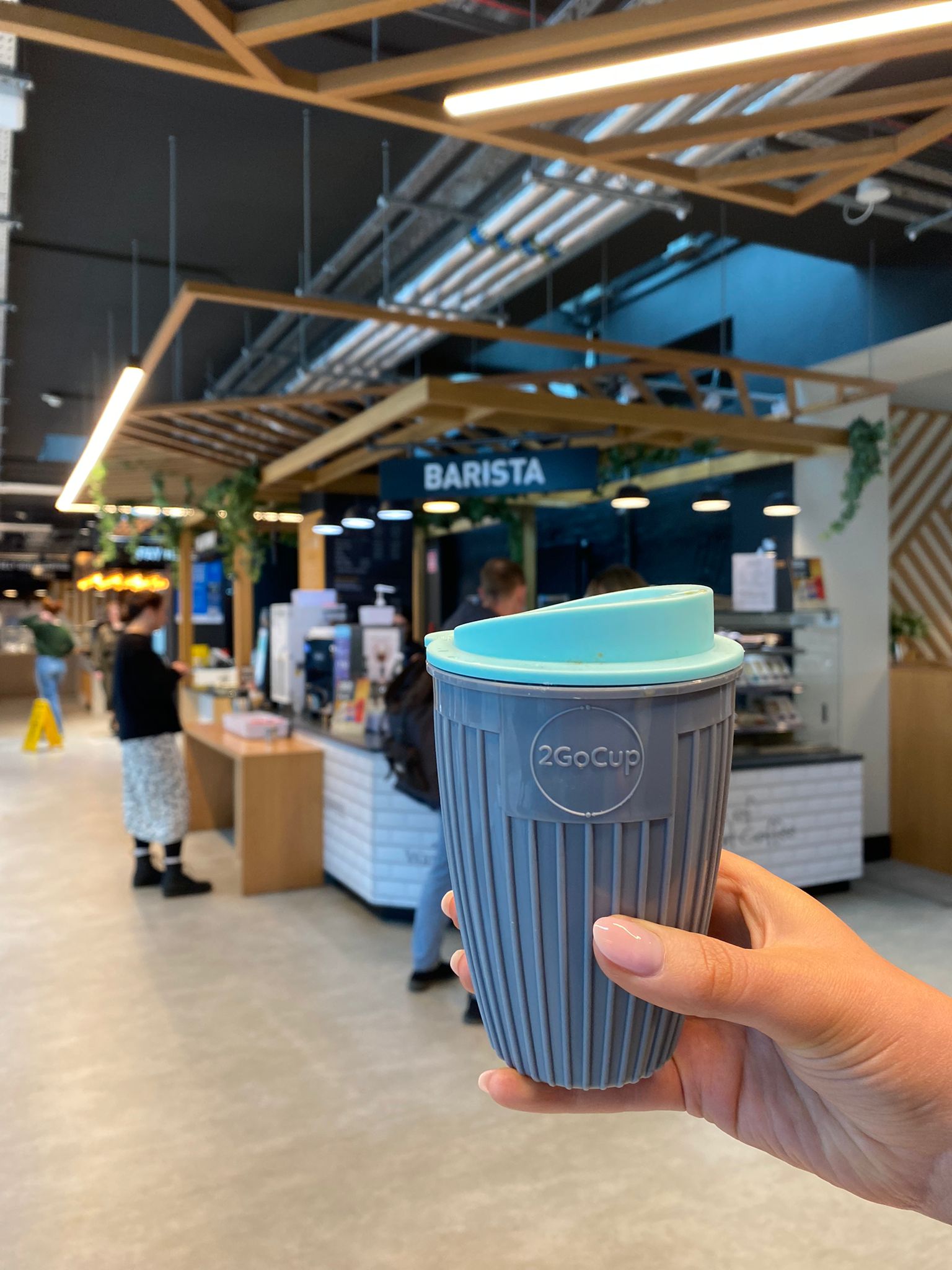Coffee culture is on the rise in Ireland, some claiming that “Coffee shops are the new pubs”. While it’s great to see thousands of independent coffee shops popping up all around the country, this success brings with it a new concern. Given that 22,000 coffee cups are being dumped every hour, it is understandable that people are concerned about the environmental impact.
In response to these issues, keep-cups have become a hot topic in recent years. The need to move away from disposable products has become increasingly evident, with governments and companies creating more opportunities with reusable products. Within the movement, the “2GoCup” Scheme has gained increasing popularity.
The scheme is simple: for a two euro deposit, individuals purchase a 2GoCup from a partnering café instead of a single-use cup. Once finished, they can return the cup to any partnering café and collect their deposit, or they can keep the cup for their own use. The scheme’s environmental success relies on individuals either returning the cup or using it regularly as a substitute to a single use cup. The two euro deposit-return system has been implemented in different locales across Ireland including the catering facilities across Trinity College Campus.
The scheme is marketed as a successful way to reduce waste. However, the success of 2GoCup as a business hinges on individuals not returning the cup. In turn, partner cafés are required to purchase more 2GoCups. In other words, it is in 2GoCup’s interest that the cups be unreturned. In Trinity alone, over 15,000 cups have been purchased from 2GoCup to be used in the four cafés across campus. Trinity currently has no stock of cups left, so where have they all gone? In a survey of over 200 students and staff from Trinity College, we have found that of those who kept their 2GoCup, only 29% ‘always’ use the unreturned cup, with 43% ‘sometimes’ using it and 26% ‘never’ using it. Based on these results, roughly 3,900 2GoCups are never used again, 6,450 are only sometimes used and just 4,350 of the 15,000 cups are always used.
Given that one cup must be used 15 times in order to make it environmentally preferable to a disposable cup, these results suggest that the scheme is not in fact environmentally beneficial. We asked the CEO of 2GoCup, Kevin Murphy, how the cups are tracked. He responded that they have a system but it is “internal and only shown to businesses”. In an interview with Moira O’Brien, head of catering at Trinity College Dublin, she told us that she was unaware of any tracking system for the cups. We asked 2GoCup for further detail on the tracking system, but we received no response.
Trinity Catering have expressed disappointment in the scheme. After ordering 3,000 new cups for Trinity College in early February, they still have not received this order. Trinity Catering have contacted 2GoCup on multiple occasions but have received “radio silence”. Without any stock, cafés on campus were not able to participate in the scheme during Trinity Green Week (February 11th – 15th ), and had to sell disposable cups instead. Meanwhile, Moira mentioned that she saw on social media that the scheme had now expanded to Tullamore, yet they still had no response on when they were getting more stock. Moira made it clear that she would not recommend the company. It’s only a matter of time before a new company launches a similar scheme that customers like Trinity College would move to.
If cafés are constantly ordering more of the 2GoCups and do not know what is happening to them, is there an argument that the 2GoCup is being used as another single-use item? 2GoCup’s social media boasts the thousands of single use cups that the scheme saves from going to landfill, but the thousands of unreturned and untraceable polypropylene 2GoCups are forgotten about. We encourage individuals, café owners, and 2GoCup to reevaluate their actions, considering what changes they can make to promote the sustainable use of this scheme.
How can you enjoy your coffee more sustainably?
Active participation is necessary to make this scheme a success. In order to make sure YOUR 2GoCup is having a positive environmental impact it needs to either be USED regularly instead of a single use cup or RETURNED to a partnered café. Simply collecting the cups and letting them gather dust defeats the purpose entirely.
What about the bigger picture?
It’s time to reevaluate the incentives at play. Perhaps a higher deposit would sharpen our collective conscience, compelling us to return the cups. Or possibly the introduction of a tracking system could unveil the life cycle of each 2GoCup and foster a sense of accountability.
The need to constantly replace the missing cups is becoming more of an issue and reversing any positive environmental impacts that using keep-cups may have had. By returning cups that are not regularly used, we can ensure their continued circulation in the scheme, maximizing their utility and minimizing their environmental footprint. In order to reverse this trend, we believe that 2GoCup needs to develop and implement an efficient tracking system for these cups. We understand that this will take time to develop, so meanwhile we suggest that the deposit price be raised to four euros in order to provide more of a financial incentive for customers to return the cups.
The most environmentally friendly way to purchase a hot beverage is to have it sit-in, in a ceramic cup. We understand that people are busy so this isn’t always feasible. If this is the case then invest in your own keep-cup! Brands such as Chilly’s, Yeto, Forrest Cork Cups and KeepCup are brands that are stylish and durable.








